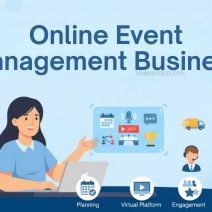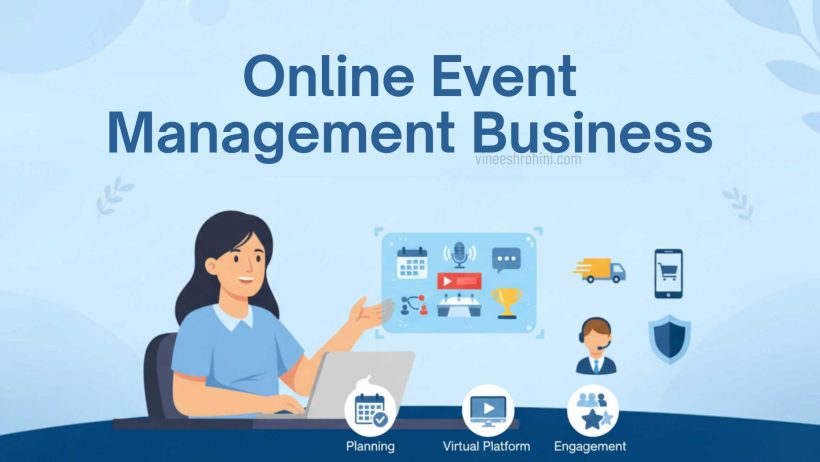Online Event Management Business : The event management industry has evolved dramatically over the past decade. Once limited to physical gatherings, the sector has expanded into the digital landscape, with online and hybrid events becoming the new standard. In today’s tech-driven world, companies, creators, and individuals rely on digital platforms to host virtual conferences, product launches, weddings, seminars, workshops, and entertainment shows. This shift has given rise to a new and profitable segment — the online event management business.
Table of Contents
If you have strong organizational skills, creativity, and a passion for connecting people, starting an online event management business in 2025 could be one of the most rewarding entrepreneurial ventures. This detailed 3000-word professional guide will explain every aspect of launching, managing, and growing an online event management business — from niche selection and legal setup to marketing, client acquisition, and scaling strategies.
1. Understanding the Online Event Management Industry

Online event management involves the planning, organization, and execution of virtual or hybrid events. Unlike traditional events that depend on physical venues, online events are hosted through digital platforms such as Zoom, Microsoft Teams, Hopin, or Airmeet. These events can range from small webinars to large-scale conferences and global expos.
Why the industry is booming in 2025:
- Global Accessibility: Virtual events allow organizations to connect with audiences worldwide without geographical barriers.
- Cost Efficiency: Online events reduce costs related to venue rentals, travel, and logistics.
- Eco-Friendly Approach: They are more sustainable, cutting down on physical waste and travel emissions.
- Data-Driven Insights: Digital platforms provide analytics on attendee behavior, engagement, and satisfaction.
- Technological Advancements: Artificial Intelligence, AR/VR, and automation tools are enhancing virtual experiences.
In 2025, online event management isn’t just an alternative — it’s a mainstream business opportunity with immense scalability.
Also Read : Top Online Businesses : That Make the Most Money in 2025 – Comprehensive Guide
2. Defining Your Event Management Niche
Choosing a niche helps you focus your services, attract specific clients, and build industry expertise. The event management space is vast, and specialization helps create brand differentiation.
Popular online event niches include:
- Corporate Events: Webinars, conferences, product launches, annual meets, and trade shows.
- Educational Events: Online classes, workshops, academic fairs, and university seminars.
- Social Events: Virtual weddings, birthdays, anniversaries, and reunions.
- Entertainment Events: Live concerts, online festivals, and stand-up comedy shows.
- Non-Profit and Charity Events: Fundraisers, awareness campaigns, and digital marathons.
- Hybrid Events: Events that combine both online and offline elements for greater audience engagement.
How to choose your niche:
- Analyze your strengths (corporate coordination, creativity, or technical expertise).
- Identify high-demand event categories in your area or globally.
- Study what competitors specialize in and find untapped areas.
- Choose a niche that excites you, as it will reflect in your creativity and delivery.
Pro Tip: Start with one or two focused niches (like corporate webinars or virtual weddings) before expanding into multiple segments.
3. Conducting Market Research
Market research lays the foundation for any business. Understanding your audience and competitors will help you design better services and marketing strategies.
Key steps for market research:
- Define your audience: Determine who your ideal clients are — businesses, schools, organizations, or individuals.
- Study competitors: Visit their websites, check pricing, service offerings, and client testimonials.
- Analyze demand: Use tools like G Trends or SEMrush to study search patterns related to virtual events.
- Survey potential clients: Conduct polls or interviews to learn their challenges with online events.
- Identify industry gaps: For example, many small organizations need professional yet affordable event planning solutions.
Pro Tip: Create a “competitor matrix” to compare what others offer and where you can provide extra value.
4. Developing a Business Plan

A professional business plan helps you stay organized and provides clarity to potential investors or partners.
Components of a solid business plan:
- Executive Summary: Overview of your business, mission, and goals.
- Market Overview: Industry trends, target audience, and competitive landscape.
- Service Offerings: Detail the types of events and packages you’ll provide.
- Marketing Plan: How you’ll promote and attract clients.
- Operational Plan: Workflow, staffing, and resource allocation.
- Financial Plan: Start-up costs, projected revenues, and pricing strategies.
- Growth Strategy: Plans for scaling your business and diversifying services.
Pro Tip: Update your business plan annually to align with market changes and new technologies.
5. Legal Registration and Compliance
Establishing your business legally enhances credibility and builds trust with clients.
Steps to register your business:
- Choose a structure: Sole Proprietorship, LLP, or Private Limited Company.
- Register with the Ministry of Corporate Affairs (India) or local authorities.
- Apply for GST registration for taxation purposes.
- Open a dedicated business bank account for smooth transactions.
- Trademark your business name and logo for protection.
- Draft contracts and service agreements to avoid misunderstandings.
Pro Tip: Work with a professional accountant or lawyer to ensure compliance with business and data privacy laws.
6. Building an Online Presence
Your online presence acts as your digital storefront. Clients will judge your professionalism and reliability based on your website and social media.
How to build a strong online identity:
- Create a professional website:
- Use platforms like WordPress, Wix, or Webflow.
- Include your services, portfolio, testimonials, and contact details.
- Add a blog to share event insights and case studies.
- Optimize for SEO: Target keywords like “online event management,” “virtual event planner,” or “corporate webinar organizer.”
- Build social media profiles:
- Use Insta for visual storytelling.
- LinkedIn for corporate networking.
- YouTube for video showcases and tutorials.
- Use consistent branding: Maintain uniform colors, tone, and design across all platforms.
Pro Tip: Create a short promotional video that highlights your best work and client success stories.
7. Setting Up Essential Tools and Software
Technology forms the backbone of your online event management business. Choosing the right tools ensures smooth operations.
Essential tools for different functions:
Event Hosting:
- Zoom, Airmeet, Hopin, Microsoft Teams, or G Meet.
Project Management:
- Asana, Trello, ClickUp, or Monday.com for team coordination.
Ticketing and Registration:
- Eventbrite, Townscript, or Ticket Tailor.
Design and Branding:
- Canva, Adobe Photoshop, or Figma.
Communication:
- Slack, WApp Business, or Telegram.
CRM and Email Marketing:
- HubSpot, Zoho CRM, or Mailchimp.
Analytics:
- G Analytics, HubSpot Insights, or social media dashboards.
Pro Tip: Integrate tools for automation — for example, connect your event registration system with email marketing to send confirmations instantly.
8. Defining Your Services and Packages

Offering well-structured packages makes it easier for clients to understand your services.
Common services you can offer:
- Event concept creation and planning.
- Registration management and ticketing.
- Virtual stage design and graphics.
- Technical setup (audio, video, and streaming).
- Marketing and promotions.
- Host/moderator coordination.
- Post-event analytics and reporting.
Package models:
- Basic: Event planning, coordination, and hosting support.
- Standard: Includes design, promotions, and technical assistance.
- Premium: End-to-end management including marketing, speaker management, and data analysis.
Pro Tip: Offer add-on services like branded digital invitations or event video editing for extra revenue.
9. Building a Team
While you can start solo, an online event management business eventually needs a skilled team.
Key team roles:
- Event Manager: Oversees overall operations.
- Technical Director: Handles live streaming and technical troubleshooting.
- Creative Designer: Designs digital assets.
- Marketing Manager: Manages campaigns and client outreach.
- Client Relationship Executive: Communicates with clients and manages expectations.
- Support Staff: Assists with coordination and logistics.
Pro Tip: Initially, outsource work to freelancers or agencies to reduce overhead costs.
10. Pricing Your Services
Pricing determines your competitiveness and profitability.
Pricing models:
- Flat Fee: Fixed rate for a specific event package.
- Hourly Billing: Best for consultation and strategy services.
- Commission-Based: Percentage of total event budget.
- Retainer Model: Monthly or annual contracts with regular clients.
Factors to consider:
- Event complexity.
- Tools/software subscriptions.
- Time and manpower involved.
- Market rates and competitor pricing.
Pro Tip: Start competitively but increase your rates gradually as your portfolio grows.
11. Marketing and Promotion Strategies
Marketing is the lifeblood of your business. Without visibility, even the best services will remain unnoticed.
Effective marketing strategies for event planners:
- Search Engine Optimization (SEO):
Optimize your site for local and global searches using event-related keywords. - Content Marketing:
Publish blogs like “10 Tips for Hosting a Successful Virtual Conference.” - Social Media Marketing:
Post behind-the-scenes clips, event highlights, and client testimonials. - Paid Advertising:
Run FB, LinkedIn, or G Ads targeting business owners and marketers. - Email Marketing:
Send newsletters and personalized offers to your subscriber list. - Networking:
Join professional associations like the Event Management Association of India (EMAI) or international communities.
Pro Tip: Collaborate with influencers or event tech platforms to gain credibility and visibility.
12. Managing and Executing Events
Execution is where planning meets performance. Precision, communication, and preparation are essential.
Phases of event execution:
- Pre-Event Planning:
- Define objectives and deliverables.
- Assign team responsibilities.
- Conduct dry runs and platform testing.
- During the Event:
- Monitor live sessions.
- Engage attendees via polls, chat, and Q&A.
- Resolve technical issues promptly.
- Post-Event Activities:
- Send thank-you messages and feedback forms.
- Share event highlights and analytics.
Pro Tip: Always have backup plans — alternate internet connections, devices, and hosts.
Buy Now : Ultimate Booking Website
13. Delivering Exceptional Customer Experience
Your success depends on client satisfaction. Word-of-mouth referrals can drive the most loyal clients.
Ways to improve customer experience:
- Provide clear communication at every stage.
- Personalize your approach — tailor the event to their brand identity.
- Offer fast and responsive customer support.
- Exceed expectations with creative touches.
- Request and act on client feedback.
Pro Tip: Use CRM tools to store client preferences for future events.
14. Tracking and Evaluating Performance
To grow sustainably, you must measure performance and make data-driven improvements.
Key performance indicators (KPIs):
- Number of events managed.
- Client retention rate.
- Attendee engagement rate.
- Return on investment (ROI).
- Social media reach and brand visibility.
Pro Tip: Use analytics reports from your event platform to measure attendee satisfaction and conversion rates.
15. Scaling Your Business

Once you have established credibility, scaling becomes the next goal.
How to scale your business:
- Expand Service Offerings: Include hybrid events, influencer collaborations, and event marketing services.
- Automate Processes: Use AI tools for email automation and analytics.
- Hire a Sales Team: Focus on lead generation and client acquisition.
- Go Global: Offer services to international clients in different time zones.
- Develop Partnerships: Collaborate with event platforms, designers, and production houses.
Pro Tip: Build a strong brand identity and reputation before expanding. Growth without a solid base can affect quality.
16. Common Challenges and Solutions
Running an online event management business comes with challenges.
Challenges:
- Technical glitches during events.
- Client budget constraints.
- Managing multiple vendors.
- Time zone differences for international events.
- Market competition.
Solutions:
- Always conduct multiple test runs.
- Offer tiered packages for budget flexibility.
- Build reliable vendor relationships.
- Automate scheduling tools for time zone management.
- Focus on service quality to stand out from competitors.
17. Future of Online Event Management in 2025 and Beyond
The future of event management lies at the intersection of creativity and technology.
Emerging trends:
- AI-Driven Personalization: Tailoring event experiences based on user behavior.
- AR/VR Integration: Immersive virtual venues and interactive stages.
- Metaverse Events: Virtual reality-based gatherings gaining popularity.
- Data-Backed Decision Making: Using analytics to design more impactful events.
- Sustainable Event Planning: Emphasis on eco-conscious practices.
Pro Tip: Stay updated on event tech innovations and continuously upskill.
18. Conclusion
Starting an online event management business in 2025 is an exciting venture with tremendous potential. The digital world continues to redefine how people celebrate, learn, and connect — and you can be at the center of it. With careful planning, professional branding, reliable technology, and client-centered strategies, you can build a thriving and future-proof event management company
Buy Now : Ultimate Booking Website
The key is to balance creativity with structure — understanding that great events are not just planned but designed for experience. Your ability to adapt, innovate, and deliver consistently will determine your success in this fast-paced digital space.
If you’re passionate about coordination, technology, and creativity, there’s no better time to launch your online event management business than now.
Disclaimer
This article is for informational and educational purposes only. It should not be considered financial, legal, or professional business advice. Readers are encouraged to conduct independent research or consult experts before starting an online event management business.







